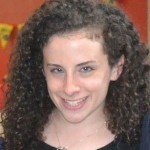Musings from Students of the Pardes Institute of Jewish Studies in Jerusalem
Posted on October 26, 2013 by Hannah Joy
From my blog:
 My days here have been filled with questions. Questions posed to and by teachers, classmates, guest speakers, and ourselves. Questions about minute details, major moral issues, and everything in between. Questions that we can easily answer right away and questions that we fiercely debate. Questions that create more questions and questions that we just leave hanging. To illustrate my point, here’s a snapshot of my Monday*:
My days here have been filled with questions. Questions posed to and by teachers, classmates, guest speakers, and ourselves. Questions about minute details, major moral issues, and everything in between. Questions that we can easily answer right away and questions that we fiercely debate. Questions that create more questions and questions that we just leave hanging. To illustrate my point, here’s a snapshot of my Monday*:
(*NOTE: Mondays are my longest days at Pardes. Classes usually end at 5pm.)
7:30am: Why is it so early?!
7:48am: Five more minutes pleaaaase? (Answer: Nope)
8:25am: Walking to Pardes. Did this hill get steeper since yesterday?
8:27am: Waiting at the intersection of Pierre Koenig and Rivka. Is there an award for most poorly timed traffic light? How do I submit an entry?
8:28am: Entering Pardes. Stairs or elevator? (Answer: Elevator)
8:30am: Chumash (Bible) class. Why was Bnei Yisrael (the Jewish people) enslaved in Egypt according to some of the classical commentators? (One answer: Because Joseph’s brothers threw him in a pit and tried to sell him into slavery. (But then why were Joseph and Jacob also punished? And how could Benjamin be punished if he wasn’t even born yet?!))
10:30am: Special guest presentation: Four Faces of Israel. How on earth do we go about dealing with a society with so many different and extremely opinionated people?
12pm: Lunchtime. What did Chef cook up for us today? (Answer: Potato leek soup and cheese and chutney sandwiches. Yum!)
1pm: More special guest presentations: Maayan, our tour guide for our day trip to Hevron, and Shai from Breaking the Silence. Specifically in Hevron, how does the history of this ancient city play out and inform what happens today? How do we create (and/or enforce) peace/calm between two peoples who have historically always been at odds with each other? What kind of solution can/will/might be feasible (ideally/theoretically/practically)?
3pm: Self, Soul, and Text class. What do some Jewish spiritual traditions have to say about dealing with obstacles we face and unpleasant emotions we experience? How can we apply these teachings and practices to our own lives?
5:15pm: Chassidut. Was the Baal Shem Tov (founder of Chassidut) really working against the establishment, as is commonly held? Or was he actually working within the establishment? What, then, does it mean for us to innovate and work to create change from within our communities, versus trying to create change from the outside?
6:45pm: Dinner. Shulchan ivrit (Hebrew table). How do you say nephew in Hebrew? (Answer: Achyan) What about businessman? (Ish Asakim)
7:15pm: Night seder. Women and mitzvot chabura (learning group). What are the rabbinic sources for the practice of married women covering their hair? Why would a married woman today choose to cover her hair (or not)? How did all the forms of hair covering (hats and wigs and scarves and thick headbands) come to be? Are you going to cover your hair when you’re married?
9:35pm: Walking home from night seder. How is it almost 10pm already?!
11:00pm: Is it bedtime yet?!
11:47pm: Did I fall asleep watching How I Met Your Mother again? (Answer: Yes)
12:00am: Drifting off to sleep. What do I get to learn tomorrow?